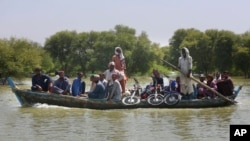The United Nations said Wednesday that it had so far received $90 million, or only about 11%, of the $816 million total flash appeal to assist 9.2 million flood victims in Pakistan.
The pace of the arrival of the committed amount has slowed in the past two weeks, the U.N. lamented in a statement.
“We are responding with what we have, but it is not enough. We appeal to the world: Please speed up the response,” it said.
U.N. and Pakistani officials say the major concerns are outbreaks of waterborne diseases, nutrition, drinking water, shelter and food security in the aftermath of the climate change-induced flooding that has affected 33 million people in the country.
Pakistan could see as many as 2.7 million malaria cases in the 32 worst-hit districts by January 2023, and 5.74 million more people are a step or two away from famine, the U.N. warned.
The flooding submerged huge swaths of the country of about 220 million people, killed more than 1,700 people, including 639 children, washed away 800,000 homes and killed more than 1.1 million livestock.
"Seventy percent of those affected by the floods are women and children. Seventy-nine percent of crops in Sindh [province] are damaged completely. These are not just numbers in a vacuum but illustrate the scale of the damage," Pakistani Climate Change Minister Sherry Rehman said Wednesday.
The U.N. Food and Agriculture Organization estimates that 3.8 million hectares of cropland in Pakistan were inundated.
The Pakistani government estimates that the flooding destroyed at least 1.6 million hectares of farmland, and with large areas still underwater, new crops cannot be planted, particularly in the southern Sindh province.
The U.N. noted Wednesday that more than 350,000 small farms are in flood-hit areas, and if those farmers are unable to sow seeds in time, it will directly impact the food basket for all of Pakistan.
“The planting window is very short, starting now [October] till December, and farmers will need seeds and fertilizers immediately,” the U.N. said.
US cautions against aid misuse
Meanwhile, reports of corruption and theft of flood relief items, especially in Sindh, have prompted the United States, a major humanitarian aid contributor, to caution against such practices.
“This is something we take very seriously, not only in Pakistan but anywhere around the world where American taxpayer dollars are implicated and when there is an urgent humanitarian interest at stake, which is clearly the case, in terms of the response to the flooding in Pakistan,” State Department spokesman Ned Price said Tuesday.
Price told reporters in Washington that "adequate tracking mechanisms" were in place to ensure U.S. response activities were meeting the humanitarian need in Pakistan.
“We also are required to provide regular program updates on the progress of activities and any security concerns, and we require our partners to immediately report any potential diversions, seizures or losses immediately," he said. "So, this is something we take very seriously.”
